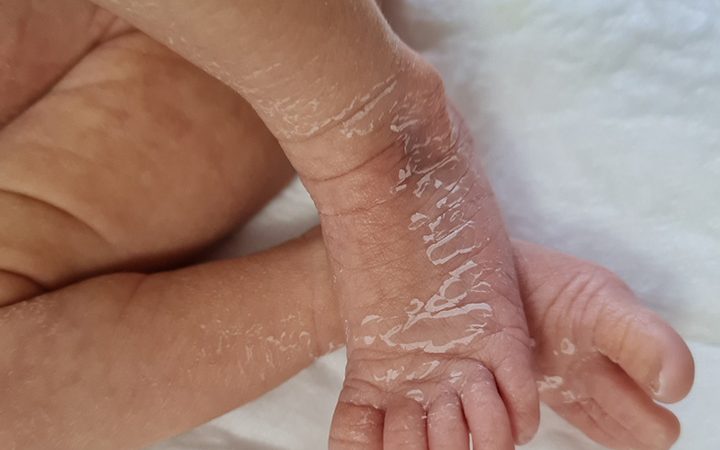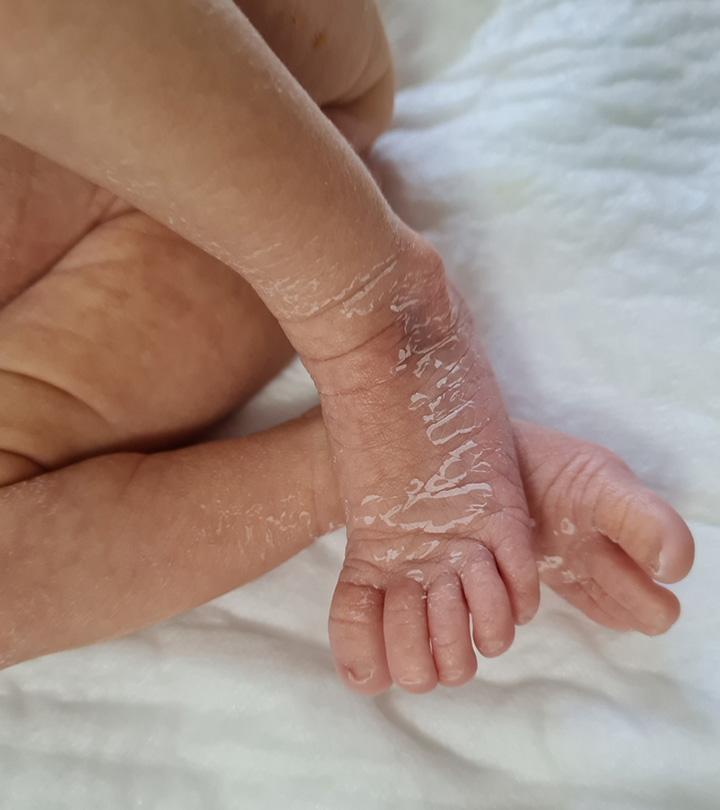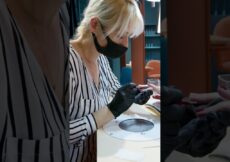Newborns have extremely sensitive skin and may go through some changes in appearance and texture in the first few weeks of birth. Most babies have dry patches of skin, causing skin peeling, which in many cases, is normal and does not require special care. In case of persistent or severe skin peeling, the right treatment could help resolve the issue.
Read this post to learn about the causes and treatments for skin peeling in newborns.
Is It Normal For A Newborn To Have Peeling Skin?
In most cases, skin peeling in newborns is normal since their delicate skin is susceptible to dryness, causing the top-most layer to flake off in the first few weeks post-birth. However, several external factors can cause irritability and rashes due to their skin’s delicate nature. Further, most of the time, the issue resolves on its own (1).
What Are The Causes Of Newborn Skin Peeling?
The following are some factors that cause skin peeling in newborns:
- Vernix caseosa: This thick, waxy coating protects the baby from the amniotic fluid inside the womb. Losing this outer layer may cause natural skin peeling in the first few weeks of birth (2).
- Full-term birth: The skin of newborns differs according to the time of birth. Premature babies (born before forty weeks) usually have less skin peeling. A full-term baby’s skin is thicker, and their skin may lighten a few days post-birth and become dry and flaky (3).
- Eczema: Eczema is characterized by a dry rash on the face, elbows, and knees. It is an allergic skin condition, and the itchiness may lead to skin peeling (4).
- Ichthyosis: A rare condition due to genetic mutations where the dead skin becomes extremely dry and flaky and peels when rubbed (5).
- Psoriasis: An autoimmune disease that occurs due to excessive skin inflammation, leading to the rapid shedding of skin cells. However, it is rare for infants to be affected by it (6).
When Does Newborn Skin Stop Peeling?
There is no defined time frame by when a newborn’s skin may stop peeling. However, if your baby’s skin shows no signs of improvement in two weeks, you could contact your pediatrician (7).
What Are The Treatments And Remedies For Skin Peeling In Newborns?
The following are some ways to treat skin peeling in newborns (7) (8):
- Moisturizer: A medically prescribed hypoallergenic moisturizer, selected depending on the severity of dryness, can help restore the skin’s moisture. Apply it right after bath time for maximum effectiveness.
- Topical ointments: These can be used as prescribed to help prevent dryness caused by eczema and psoriasis.
- Short bathing time: Keep the baby’s bath time to under ten minutes and avoid daily baths if possible. Since hot baths can cause further dryness, use room temperature or slightly warm water (9).
- Avoid using soap: Do not use soap too often as it strips the skin’s natural oils, causing excessive dryness. Baby soaps and body washes are milder but shouldn’t be used daily.
- Keep the room humid: Dry air may further aggravate irritation and cause heat rashes. Maintain the humidity in the baby’s room by running a cool-mist humidifier.
- Cotton clothing: Dress the baby in clothes made from cotton or natural fabrics. Cotton is preferred as it is soft and allows the skin to breathe, keeping it healthy and comfortably covered.
Several factors can cause skin peeling in the first few weeks of life, and most often, it can be managed with home remedies and medical advice. Though it is a common skin issue, it is important to be alert and contact your child’s pediatrician in case of severe dryness. With care and attention, your baby will have healthy skin in no time.
References:
MomJunction’s articles are written after analyzing the research works of expert authors and institutions. Our references consist of resources established by authorities in their respective fields. You can learn more about the authenticity of the information we present in our editorial policy.
The following two tabs change content below.




































